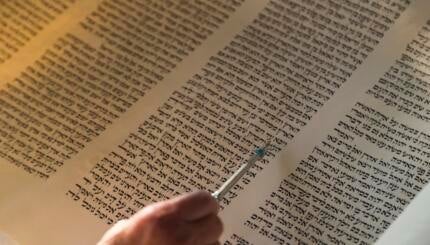Reprinted with permission from JSafe: The Jewish Institute Supporting an Abuse Free Environment.
Victims of abuse often face great doubts and skepticism when they speak out against their perpetrators. One of the most insidious reasons for these doubts is that abusers are most often people who are well known to their victims and to the family, friends, or community officials to whom the revelations are made. The accusations are met with incredulousness.
Uncritical Assumptions
Perpetrators can be anyone: husbands, wives, mothers, fathers, and siblings; rabbis and teachers; doctors and therapists; counselors, coaches, and neighbors. This familiarity is not only a factor in the reaction of others, but it is a significant obstacle for victims as they contemplate revealing the abuse and asking for the help and support they need.
At first glance, Jewish law seems to support this approach. The famous Mishnah in Pirke Avot brings R. Yehoshua ben Perahyah’s teaching, "Ve-hevei dan et kol ha-adam le-kaf zekhut–Judge everyone favorably." (Avot 1:6; Shevu’ot 30a) Likewise, it is forbidden to be hoshed be- kesherim, suspicious of those who have unblemished reputations.In fact, we are promised that if we give others the benefit of the doubt, God will act towards us in the same manner.
With your help, My Jewish Learning can provide endless opportunities for learning, connection and discovery.
The Talmud illustrates the importance of judging others favorably by recounting three cases that might have raised concerns of inappropriate behavior. In each case, generous and uncritical assumptions of innocence were made–assumptions which proved to be correct. In one such case, a prominent rabbi, after redeeming a young woman who had been taken hostage, had her sleep at his feet on the road home. When his students were questioned about the episode, the students related that they did not suspect their teacher of any inappropriate behavior, but that they assumed–correctly–that he did this in order to protect her from those who might take advantage of her. (Shabbat 127a)
Why Judge Favorably?
There are a number of reasons why it is proper to give people the benefit of the doubt. One is that the biblical injunction "be-tzedek tishpot et ‘amitekhah" which refers to the judicial obligation, "you shall judge your neighbor with righteousness," also is interpreted to mean "you shall judge your neighbor as righteous." Society’s interests are served not only by advancing the cause of justice but by furthering the integrity and innocence of each and every one of its members.
Another reason is based on the principle of hazakah, a legal theory that enshrines the status quo — people are presumed to be as they have always been. Thus, every person is to be considered innocent until proven guilty.
One formulation of this hazakah posits that since people are born guiltless and honest, they continue to be so. A second formulation focuses on the established behavior of a good person. His previous behavior patterns have established a presumption that all his actions are good and noble.
A variation of this argument focuses on the character of Jews in general. Since the rov (the majority) of Jews behave in good and noble ways, the odds are that this person is part of that majority. Thus, we judge him and his actions favorably.
Another approach explains that we are to assume that we do not know the entire story, that we do not properly understand another person’s motivations, or that the unseemly act may have merely been an innocent mistake. In fact, we are warned not to judge another "until we have been in his place." Even if we observe unquestionable misconduct by a Torah scholar, a person whose piety and conduct are presumed to be beyond reproach, we must assume that he has immediately repented for his misdeeds.
This attitude is the key to maintaining good interpersonal relationships. After all, it is not uncommon for those who live in close proximity to each other to say or do things that may be perceived as slights or insults; relationships suffer. Doubt, resentment, and suspicion are not uncommon. Unless we are generous in our judgment and forgiving in our dealings, disagreement with our friends and alienation from them are possible. Consequently, giving another the benefit of the doubt ensures the integrity of familial and communal relationships
Others see this principle as a means of protecting one’s own moral integrity. Favorable judgment impacts a person’s own perspective of the world, training him to see only the good and noble. This inspires a positive and optimistic worldview which protects him from the pernicious influence of evil activities and immorality.Favorable judgment also helps a person focus on his own weaknesses and flaws rather than the failings of others, and can serve as a catalyst for introspection, self-growth, and repentance.
Always?
Do these principles mean that those who are abused must somehow judge their abuser favorably? Does this mean that those who do not have first-hand experience or knowledge of an act of abuse must refuse to believe untoward accusations?
Despite the call to judge favorably, there is room for suspicion and for precaution. One Talmudic dictate instructs, "A person should always consider others as thieves, while honoring them like Rabban Gamliel." (Masekhet Derekh Eretz, Pirkei Ben Azzai 3:3)
How do we resolve the tension between the requirement to judge favorably on the one hand, and the need for caution and suspicion on the other? One answer is to make a distinction between those we know who generally behave appropriately and strangers, whose motives and dispositions are unknown to us. The former require our sympathetic assessment, the latter do not.Another answer suggests that one should be wary and suspicious of others, but at the same time treat them respectfully as if they were innocent.
Consider the Mishnah, Yoma 18b, which relates how the priestly elders charged the High Priest prior to his officiating in the Temple’s "Holy of Holies" on Yom Kippur. To ensure that he would follow the rituals according to the rabbinic, Pharasaic requirements, and not in accordance with the interpretations of the Saduccees:
"They adjured him, took their leave, as they said to him: ‘Sir High Priest, we are messengers of the court and you are our messenger and the messenger of the court. We adjure you by He Who made His name to dwell in this house that you do not change anything of what we said to you.’ [The High Priest] turned aside and wept and they turned aside and wept."
The Talmud explains that "he turned aside and wept" because they suspected him of being a Sadducee, and they turned aside and wept for having suspected him and not judging him favorably. (Yoma 19b) Maimonides, in his commentary on the Mishnah dealing with the exhortation of the elders of the High Priest before Yom Kippur states that positive presumptions are suspended with regard to strangers when there is a hekhreh gadol, a critical need to do so.
Another resolution is offered by R. Moshe Soloveitchik (1879-1941) who suggested that in the case of the High Priest and the elders on Yom Kippur, the elders were justified in their actions. He submits that while one may look at a person’s past behavior in a charitable light, such openness is not required — and may be inappropriate — with regard to future actions.
The Rest of the Story
This predisposition to give others the benefit of the doubt is limited in its application. If we accept the argument that it is based either on hazakah or on rov, it is important to note that these principles are operative only in cases of doubt, and only when it is impossible to otherwise investigate and establish the facts of this case. While we may initially want to reserve final judgment about the allegations, we are obligated to follow through and establish, to the best of our ability, the facts of the case.
In addition, the hazakah of innocence is a weak one. Although people are born innocent or have established a track record of the same, King Solomon himself reminded us that "There is not a righteous person on earth that does good and that does not sin." (Eccl. 7:20). We need to be concerned about those failures, especially when they may be harmful to others.
Furthermore, the obligation to judge others favorably, according to the Mishnah, applies to all people, including the accuser. If we are to give others the benefit of the doubt, we must do so for the accuser as well. We are not to assume automatically that the allegations are false, nor are we to assume automatically that the accusations are true. We must treat all parties with deference, as if all were innocent of wrongdoing, but we must investigate carefully and thoroughly, and in a timely manner.
Finally, we cannot let our favorable judgment cause us to ignore possible violations of Jewish law. The Torah obligates us to rebuke those who have sinnedas well as to protect the safety and welfare of the community.Automatically deciding another’s innocence prevents these obligations from being fulfilled.And this obligation of rebuke applies even when the one accused of doing wrong is your parent or teacher.
Justice & Mercy
It is often difficult to believe allegations of abuse, and even if the allegations are believed, to want to hold the perpetrator responsible. Feelings of compassion and pity for the perpetrator, his reputation, and his family push even well-meaning people to minimize the abuse or to minimize the perpetrator’s responsibility and the consequences he must face. But such compassion is misplaced. Denying justice to the victims of abuse denies compassion for the abused. Denying accountability for the perpetrator denies compassion for victims — past, present, and future.
Mishnah
Pronounced: MISH-nuh, Origin: Hebrew, code of Jewish law compiled in the first centuries of the Common Era. Together with the Gemara, it makes up the Talmud.
Moshe
Pronounced: moe-SHEH, Origin: Hebrew, Moses, whom God chooses to lead the Jews out of Egypt.
Talmud
Pronounced: TALL-mud, Origin: Hebrew, the set of teachings and commentaries on the Torah that form the basis for Jewish law. Comprised of the Mishnah and the Gemara, it contains the opinions of thousands of rabbis from different periods in Jewish history.
Torah
Pronunced: TORE-uh, Origin: Hebrew, the Five Books of Moses.
Yom Kippur
Pronounced: yohm KIPP-er, also yohm kee-PORE, Origin: Hebrew, The Day of Atonement, the holiest day on the Jewish calendar and, with Rosh Hashanah, one of the High Holidays.


